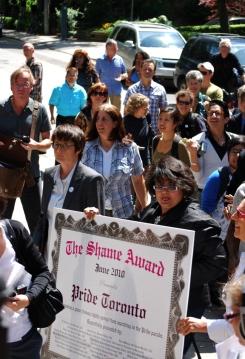Armed with an oversized cardboard shame award, a group of queers trying to give back their trophies ran into a problem on June 7: the offices of Pride Toronto (PT) were locked.
As one, two and eventually three police cruisers showed up, it became increasingly clear than no one from PT was going to accept the giant shame certificate nor the statuettes from former grand marshals, honoured dykes and other honorees.
A police officer on hand said that no one was inside the building but that someone from PT had alerted police to the protest on Sunday, apparently out of fear it would lead to vandalism.
After PT announced that its board had voted 4-3 to ban the term “Israeli Apartheid” from the parade, queer community leaders mobilized to pressure PT’s board to reverse its decision. First, Alan Li refused to accept the title of grand marshal, then Jane Farrow declined the honoured dyke title. Since then, both Michelle Walker (community service award) and ILGA (international marshals) have turned down honours.
During the press conference, PT issued a statement on its website, saying the decision to ban the term “Israeli Apartheid” was not taken lightly.
“The board of Pride Toronto listened to members of our community,” it said. “What we heard overwhelmingly was that the use of the words ‘Israeli Apartheid’ made participants feel unsafe.”
Tim McCaskell, a member of Queers Against Israeli Apartheid (QuAIA), spoke to Xtra after PT’s release.
“If people feel unsafe, I would suggest that they are being manipulated,” he said. “If the word is ‘uncomfortable,’ well, Pride makes a lot of people uncomfortable.”
An hour earlier, you could have heard a pin drop when James Loney approached the podium at the 519 Community Centre, where more than 100 queers gathered for a press conference before marching on the PT office.
Loney — a peace activist who spent four months as a hostage in Iraq — was one of nearly two dozen PT honorees giving back their awards.
“Us queers know it in our bones: silence equals death,” Loney said, as he discussed how silence affected him and his partner following his abduction.
Watch video of the press conference:
Loney was joined by Farrow, Walker and a raft of others who spoke against PT. On hand were:
James Loney (“Fearless” Theme Award, 2006)
Zahra Dhanani (Honoured Dyke, 2006)
Sky Gilbert (Grand Marshal, 2000)
Faith Nolan (Honoured Dyke, 2009)
El-Farouk Khaki (Grand Marshal, 2009)
Rachel Epstein (Honoured Dyke, 2007)
Gareth Henry (International Grand Marshal, 2008)
Anna Willats (Honoured Dyke, 2008)
JP Hornick (Grand Marshal, 2002)
John Greyson (Arts & Culture Award, 2009)
Savoy Howe (Award for Excellence in Sports, 2008)
Leonardo Zuniga (Human Rights Award, 2009)
Matthew Cutler (Youth Award, 2009)
Michelle Walker (Community Service Award, 2010)
Jane Farrow (Honoured Dyke, 2010)
Six others were to return their awards but couldn’t attend in person:
Gloria Careaga and Renato Sabbadini (International Grand Marshals, 2010)
Faisal Alam (Spirituality Award, 2009)
Victor Mukasa (International Grand Marshal, 2009)
Salah Bachir (Grand Marshal, 2005)
Rosanna Flamer-Caldera (International Grand Marshal, 2007)
Alan Li (Grand Marshal, 2010)
Discontent with PT went beyond its banning of “Israeli Apartheid,” as speaker after speaker drew links between the act of censorship and other moves to whitewash the celebrations.
Farrow pointed out that performers on all PT stages must sign an agreement promising not to say anything offensive or political. Farrow says the clause, which has been in effect since 2008, was defended by PT organizers as preventing musicians from endorsing, for instance, mayoral candidates.
“This is not speech that anyone needs to be protected from,” she said.
JP Hornick, one of the women charged in the Pussy Palace raids, decried the de-sexing and de-politicizing of Pride.
“This is not a parade; it’s a march. It’s about sex. It’s about who we fuck,” she said.
Anna Willats, Pride Toronto’s honoured dyke in 2008, told the boisterous room that queers need to take back Pride “if we want to put on a World Pride [in 2014] that doesn’t look like the Santa Claus Parade.”
Performer, playwright and provocateur Sky Gilbert remembered his experience of being told not to perform sex acts on his float in the late ’90s, after he gave head to a dyke’s strap-on dildo the year before.
He also defended PT executive director Tracey Sandilands — sort of.
“I’m sure that she’s a nice person. I suspect that she’s maybe a nice person. Tracey Sandilands is the new face of corporate Pride, but she’s just doing her job,” he said, adding that political queers have allowed Pride to become a sanitized spectacle.
Musician Faith Nolan says that she’s been following as alternative Pride events spring up. She was invited to perform at one — apparently to be held at the Gladstone — which was to be a non-political show of unity that didn’t choose sides between PT and QuAIA.
“I looked at it and I emailed them back and said, ‘Absolutely not,’” adding, “If you don’t stand for something, you’ll fall for anything.”
Groups will outline plans for alternative Pride celebrations at a community meeting at The 519 tonight (Monday, June 7), at 6:30pm. The proceedings will be streamed at xtra.ca. (UPDATE: Watch our recording below. First chunk missing due to internet connection issues at the event — our apologies!)


 Why you can trust Xtra
Why you can trust Xtra


